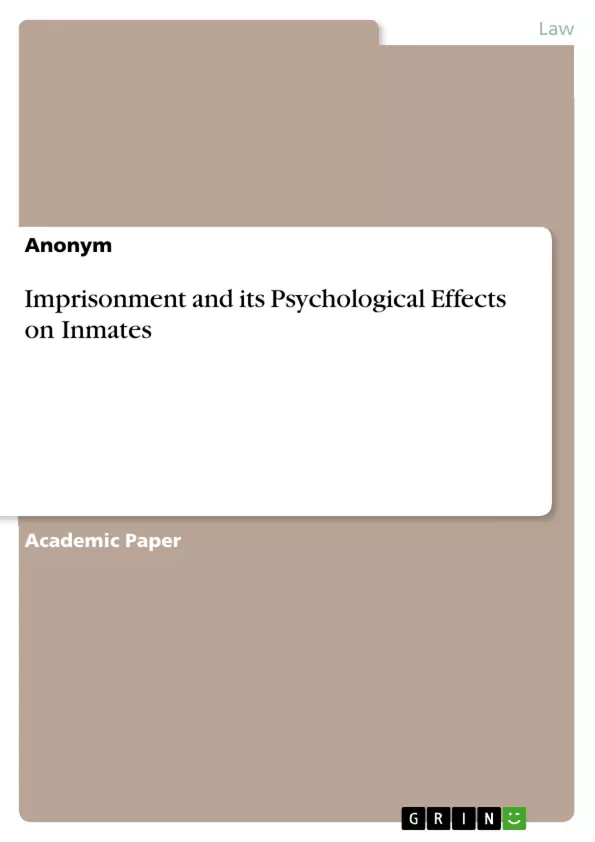An individual coming into prison represents a form of sanction that society inflicts on the individual for the deviation of its moral and juridical laws. While a deprivation of liberty causes several consequences for the imprisoned people, both during detention as well as after release, it is not seldom that the psychological consequences are the most serious ones.
The circumstances of living in a place where one's safety and human dignity is likely to be threatened on a daily basis are usually challenging to the maintenance of a sound mental condition. The size of the challenge varies from prisoner to prisoner and occurs in many forms. The special social environment a prison consists of is likely to cause the process of "prisonization" to happen within the prisoners. It's causes and impact are subject to this term paper.
Inhaltsverzeichnis (Table of Contents)
- Introduction
- Prison Climate
- Psychological Consequences
- Dependence on Institutional Structure
- Interpersonal Distrust, Suspicion and Psychological Distancing
- Incorporation of Exploitive-Aggressive Prison Norms
- Decreased Self-Esteem and Personal Value
- Post-Traumatic Stress Reactions as a Result of Prison Conditions
- Coping with Psychological Consequences
- After Prison Release
- Conclusion
Zielsetzung und Themenschwerpunkte (Objectives and Key Themes)
This term paper explores the psychological consequences of imprisonment on inmates, examining the impact of the prison climate and the process of 'prisonization'. The paper aims to provide an overview of the challenges faced by individuals incarcerated in a restrictive environment and the potential effects on their mental health, relationships, and reintegration into society.
- The impact of prison climate on inmates' psychological well-being.
- The process of 'prisonization' and its influence on inmates' behavior and relationships.
- The psychological consequences of imprisonment, including dependence, distrust, and diminished self-esteem.
- Coping mechanisms employed by inmates to navigate the challenges of prison life.
- The challenges of reintegration into society after release from prison.
Zusammenfassung der Kapitel (Chapter Summaries)
The introduction establishes the context of imprisonment as a form of societal sanction and highlights the significant psychological consequences for individuals both during and after detention. The chapter explores the unique social environment of prisons, emphasizing the role of interpersonal relations, the hierarchical structure, and the potential for violence.
The chapter on prison climate delves into the social dynamics within prison institutions, highlighting the unique structure, behavior systems, and inmate codes that emerge. It emphasizes the challenges faced by inmates in maintaining mental health and the prevalence of violence in various forms.
The chapter on psychological consequences examines the impact of custodial environments on inmates' psyches, behaviors, and relationships. It explores the process of 'prisonization' and the unique set of psychological adaptations that develop to cope with the demands of prison life.
The chapter on dependence on institutional structure explores the effects of restricted freedom and autonomy on inmates' psychological well-being, focusing on the dependence on institutional routines and the potential for decreased self-initiative.
The chapter on interpersonal distrust, suspicion and psychological distancing examines the impact of the 'right of the stronger' on inmate relationships, highlighting the heightened awareness of threat and the difficulty in building trust within the prison environment.
Schlüsselwörter (Keywords)
The key terms and concepts explored in this term paper include imprisonment, psychological consequences, prison climate, prisonization, dependence, interpersonal distrust, suspicion, psychological distancing, self-esteem, post-traumatic stress, coping mechanisms, and reintegration.
- Arbeit zitieren
- Anonym (Autor:in), 2018, Imprisonment and its Psychological Effects on Inmates, München, GRIN Verlag, https://www.hausarbeiten.de/document/541495


